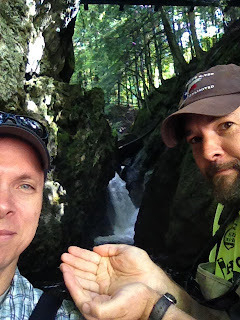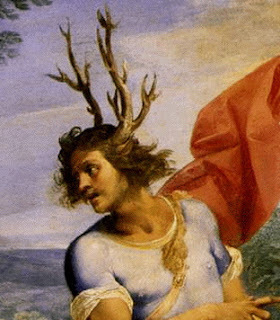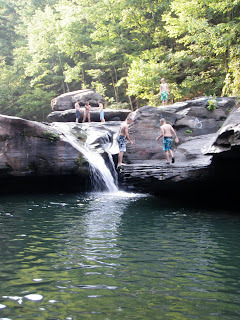hunting
Leopold On Sport And Ethics
- Aldo Leopold, A Sand County Almanac
Green Mountain Creek
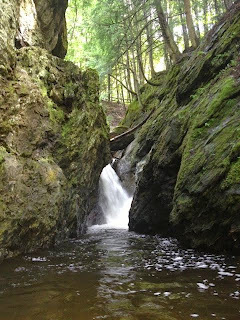 Matt and I stand thigh-deep in one of the small streams that
tumble down the eastern slopes of the Green Mountains. Many of those
streams, including this one, have carved steep gorges over the
millennia. As the water falls it strips away the sand and loam, leaving
a course choked with jumbled boulders.
Matt and I stand thigh-deep in one of the small streams that
tumble down the eastern slopes of the Green Mountains. Many of those
streams, including this one, have carved steep gorges over the
millennia. As the water falls it strips away the sand and loam, leaving
a course choked with jumbled boulders.Every year a few more trees, undercut by the current, tip over into the stream, where they lodge against the boulders and form temporary dams. As the water flows over those dams it digs deep plunge pools, bubbling and swirling for a few feet, then quickly settling into swift, clear, tea-colored glassy pools. The water slows only long enough to catch its breath before it plunges again, stair-stepping down the mountain, moving the mountain itself downstream one grain of sand at a time.
Beside us, logs carpeted in moss play host to uncounted lives of plants and animals. Trees reach their branches down into the cleft cut by the river, searching for sunlight wherever they can in this steep gorge. Small flies whirl restlessly across our vision. Their blue wings and olive bodies seem an unnecessary and extravagant dash of color on something so small, so ephemeral.
Vermont is named for the greenness of its mountains, or les monts verts as the first French settlers called these ancient hills. One of the rivers nearby is called the Lemon Fair, its name preserving the French sounds in misplaced English words. A sweeping glance would call this place green, but it only takes a moment of slowing down to really look before you see all the rainbow represented here.
Much of the color is underwater, on the scales of the fine-featured trout that fin the current before us. The native brook trout are dappled a vermiculated green above, fading to pale bellies below. Their fins are slashed with bright red and white. The rainbow trout, imported from the west coast, iridesce when a beam of sunlight finds its way down through the leaves and the water. The young brown trout - far from their native Europe - shine like salmon. Under the rocks small tan sculpin harvest tiny invertebrate meals.
Gray stones slide slower than glaciers down the bank, moving imperceptibly and irresistibly toward the sea. On the bank, seven tiny mushrooms stand up, no taller than my thumb, their caps bright orange like yearling efts.
It is a perfect day. We are grateful to receive it, grateful to be here, to stand in these waters as their life flows around us.
*****
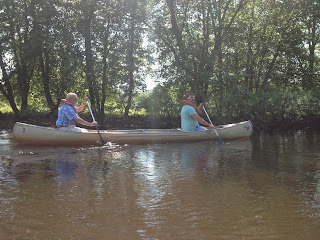 |
| My friends Bill and Brian paddle the Concord River, as Thoreau once did. |
“[F]ishers can be natural historians and waterside contemplatives par excellence."
Anecdotally, I find that hunting and fishing have made me less of a carnivore, and increasingly concerned with animal flourishing. (The quote from Stephanie Mills is found in Epicurean Simplicity, published in Washington, Covelo, and London: Island Press/Shearwater Books, 2002 p.125.)
*****
Hunting, Fishing, and Climate Change
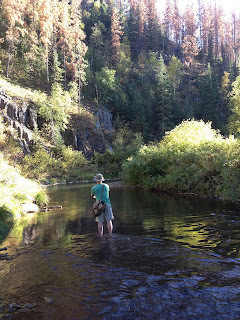 |
| Trout angling in the Black Hills of South Dakota |
This article in Outside makes just this case, with the additional point that we who seek our food in the wild are the people who ought to be advocating for real conservation: not just changes to game laws, but changes in the way we live in relationship to our world.
The Ethics of Hunting
Just as there are many versions of the myth, so there are many interpretations, and many things that Actaeon and Artemis might symbolize. The divinity of Artemis suggests to some that hunters seek something much loftier than meat for their table. Her femininity and virginity suggest to others that hunting represents sexual violence in another guise.
Both of these may be correct, but let me offer a third possibility: perhaps this is a story about virtue. Actaeon acts without virtue, and he then becomes the victim of his own plans. He makes the mistake of thinking that a hunter is the rightful possessor of all he sees, and so he fails to act with humility and gratitude. As a result, he loses everything, including those relationships that were most dear to him.
The myth of Actaeon is a vivid picture of what good hunters know: the hunter is not lord of the forest nor master of nature. Most of us live our lives as far from predation as we can arrange. A certain type of hunter attempts to erase some of that distance. The best hunters may be those who, in doing so, discover their true place in nature and emerge from the forest and field remembering their place with humility and gratitude. Actaeon forgets who he is when he attempts to take Artemis as his own, and his forgetfulness is absolute.
People Of The Waters That Are Never Still
My family has since lost the languages those ancestors spoke, and this fusion of tribes has adopted the linguistic fusion of English. I have no intention of claiming a legal place among either of the nations from which I am descended, nor even to name them here. But I find that the memory of both, and of the lands they lived on, is rooted deeply in my consciousness of who I am. Last year, while visiting the British Museum, I saw a display of various Native American peoples, including my own. It was the only time a museum has moved me to tears. The words and ways of my forebears may be mostly gone, but they are not forgotten. My father taught me to remember them and what they knew of the land we lived on, and often, while teaching me to know the woods, he would remind me that those woods were old family acquaintances.
Jacob Wawatie and Stephanie Pyne, in their article "Tracking in Pursuit of Knowledge," cite Russell Barsh as saying that "what is 'traditional' about traditional knowledge is not its antiquity but the way in which it is acquired and used." Our word "tradition" comes from Latin roots that mean something like "giving over" or "handing down." Traditional knowledge is knowledge that is a gift from one generation to the next, a gift we give because we ourselves were given it. I am grateful to my father, in ways that I may never have told him - in ways that perhaps words cannot begin to tell - for the traditions he learned and loved and passed on to me. I'm grateful that he has not let me forget.
There is, of course danger in emphasizing one's heritage and one's roots, especially if we make that the source of a distinction between ourselves and others, or a way of diminishing the lives and traditions of others. Just as much as it matters to me that I am from the people of the waters of the Catskills, it matters to me that my ancestors shared those waters with one another, people from two continents recognizing, each in the other, the waters from which both arose.
For all that I have received, for the traditions like waters pouring over the cliffs, gifts like the Kaaterskill Creek, let me give thanks. Let me give thanks with my life, offering to those who come after me, a taste of the sweetness of those same waters.
Two kinds of ducks
Recently I was speaking with some students about environmental philosophy, and about the ethical dimensions of hunting and fishing. Most of those students were not hunters, but all of them seemed to care about the environment. I asked them at one point if they knew how many species of ducks live in our region. I think the best (and most entertaining) answer I got was “Two: mallards and non-mallards.”
What struck me was how little, in general, my conservation-minded students know about the wildlife around them. And I think they are not unique in this. In fact, they may know a good deal more about nature than most of their generation.
Recently, Smithsonian published an article about conservation ecologist Patricia Zaradic. Zaradic worries that we are becoming ever more attached to video screens, and that, as a result, our knowledge of the natural world is suffering.
My fear is that we are, in a way, becoming modern-day Gnostics. (Gnostics hope to liberate the spirit from materiality by means of esoteric knowledge.)
But this is dangerous. Rejecting materiality–rejecting the body, its world, and its boundaries–seems like a bad idea. Maybe I’m wrong, and the transhumanists like Ray Kurzweil and his disciples have it right. But the body, it seems to me, is just as ethically significant as the soul or mind.
Losing touch with the material world makes it harder for us to notice when ecosystems are suffering. It also might make it easier for us to undervalue the bodily suffering of other people. And, speaking for myself, at least, I know that the pleasures of video screens are almost always more alluring than taking care of my own body. In fact, I’d be exercising right now–or duck hunting–but it has been a while since I checked in with my Facebook friends. I wonder if any of them can help me learn about ducks.
